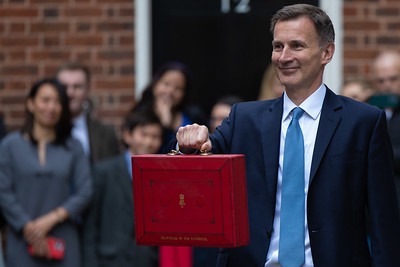On 15 March 2023, Jeremy Hunt revealed his first Budget since becoming Chancellor, focusing on ‘four Es’: employment, enterprise, education and everywhere.
In this article, we review the biggest announcements that businesses and individuals need to be aware of. Let’s get straight into it.
Personal announcements
A key theme in Hunt’s Budget was getting people back to work, as the number of people who can work but choose not to remains higher than before the pandemic and hinders growth. He outlined two main proposals.
Pensions
Hunt first announced the Government was abolishing the pensions lifetime allowance (LTA), which currently stands at £1,073,100 and meant that an individual’s pension contributions above this amount would incur a tax penalty of as high as 55%. Now, there will be no tax on pension contributions at all.
Hunt said this policy encouraged professional workers, especially doctors, to return to work. Indeed, the LTA does contribute to a lot of people leaving the NHS, but critics say abolishing the LTA altogether is too broad a stroke.
Meanwhile, the annual pensions allowance — the amount you can put aside in a pension pot before incurring a tax penalty — will rise from £40,000 to £60,000, a 50% rise.
Expansion of free childcare
Expanding the availability of free childcare was the second main policy that Hunt announced as a way to encourage people back to work.
As such, the Government will expand free childcare to parents of two-year-olds from April 2024 and then to parents of nine-year-olds from September 2025.
Business announcements
You’ll know that the Government wants to grow the economy over the next few years. As such, it was only natural for them to make a range of business announcements and policy changes.
Capital investment
The Government will introduce a ‘full expensing’ scheme to replace the super-deduction that Rishi Sunak introduced during the pandemic and ends on 31 March.
Through the full expensing scheme, companies can claim back 100% on all qualifying costs from April 2023 to April 2026, which the Government hopes will encourage them to invest in plant, machinery and technology.
R&D tax relief tweak
Hunt also announced a slight policy change to the SME R&D scheme for loss-making companies that invest heavily in innovation.
Under the change, companies that spend at least 40% of total expenditure on R&D activities will be able to claim a 14.5% credit rate rather than the standard 10% (the credit rate was 14.5%, but in November last year, Hunt announced it would decrease in 2023/24 to discourage fraudsters).
In practice, the policy tweak means that R&D-intensive companies can claim back £27 for every £100 they spend on innovation.
Investment zones
The Chancellor then announced his wish to create 12 investment zones across the UK, each getting £80 million of interventions over five years, including tax reliefs and grant funding.
Hunt also set out plans to invest £200m in local regeneration projects across England and £400m for new levelling-up partnerships.
Energy support
While the price of energy is falling, it remains comparatively high and inflated, so the Government is keeping the energy price guarantee at the current level for an extra three months rather than allowing its generosity to decrease.
The change means the average household’s energy bill will be capped at £2,500 a year. The limit was due to rise to £3,000 from April 2023 onwards.
Lastly, fuel duty will be frozen for a year, cancelling the planned increase in inflation for 2023/24. This means the 5p cut to fuel duty we saw last year is staying in place.
The rates will stay “in the long term under review, including carefully considering support for motorists, fiscal implications and use of fuels”, the Treasury wrote.
Want to talk about your business or chat about how the Budget affects you? Don’t hesitate to get in touch.

